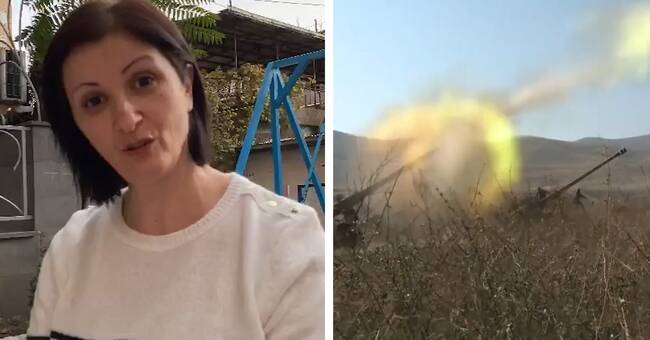It has now been a month since fighting broke out again in Nagorno-Karabakh, between the Azerbaijani military and armed Armenian groups supported by Armenia.
The mountainous area is Azerbaijani territory but has been controlled in practice since 1994 by Armenians, who have declared the area an independent republic, Artsach.
For the past 26 years, fighting has flared up from time to time.
Now there is full war again in the area.
A large part of the population - mainly women, children and the elderly - has been evacuated to Armenia's capital Yerevan.
One of those who moved to Nagorno-Karabakh is the choir conductor Nina Grigorjan.
- We were completely unprepared when the first bombs fell.
It was morning and many were still asleep.
I fled down to the shelter where I then lived with my neighbors for fourteen days.
We had no electricity or gas and a single toilet for fifty people.
Evacuated to the capital
Nina's two daughters are studying at the University of Yerevan and therefore she eventually chose to be evacuated there.
The choir at home in Stepanakert (Chankendi in Azerbaijani) is currently disbanded as most male members have moved out into the war.
- It's about boys aged 18, 19.
They have lived like any other European youth.
I think of their laughter and happy faces now and feel worried about their lives, says Nina Grigorjan.
Since the outbreak of hostilities, two ceasefires, negotiated by Russia, have been broken.
According to Russian President Putin, at least 2,000 people have died on each side.
- My relatives in Ganja tell how the city's residential areas are shelled at night, when people are asleep.
Several children have died in these attacks, says lawyer Vugar Babachanov, who himself lives in Baku.
- The occupied territories must be liberated, the 800,000 Azeris expelled from there must be able to return.
Then the Armenians are also welcome to live there if they want, but Armenia's Prime Minister Nikol Pasjinjan does not seem interested in any compromises, says Vugar.
Low confidence in peaceful solution
That confidence in a peaceful solution is extremely low on both sides is confirmed by peace and conflict researcher Hamida Giyasbayli in Baku.
She helped create IMAGINE, an organization that works for reconciliation and dialogue between the Armenians and the Azeris.
- Right now, no one in society wants to hear about peace or unarmed struggle.
Everyone just wants blood.
It feels like we are back where we were 30 years ago, says Hamida, and adds that the capital is simmering with nationalism.
Flags are waving everywhere, the Azerbaijani but also Turkish and Israeli flags.
- They want to show gratitude to the countries that support Azerbaijan militarily and morally, says Hamida and says that many sing the national anthem from the balconies in the evenings.
In Yerevan, Nina is waiting to return to her home in Nagorno-Karabakh and resume music, but she fears it will be a while.
Shortly after the interview, Nina also learns that one of her soloists has fallen at the front.

